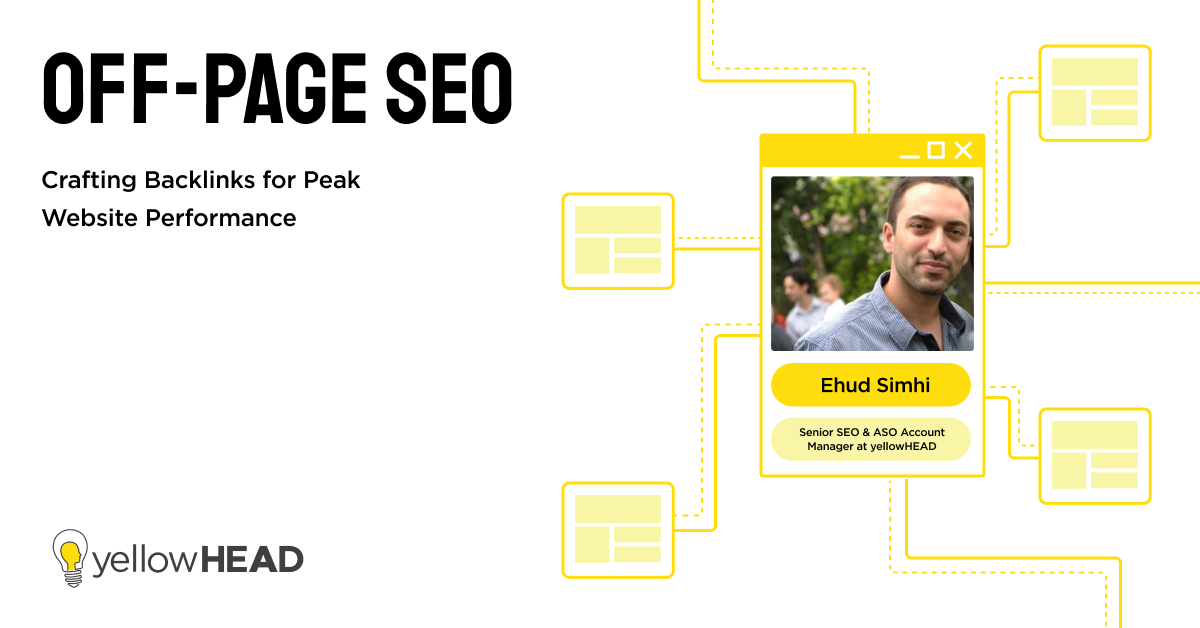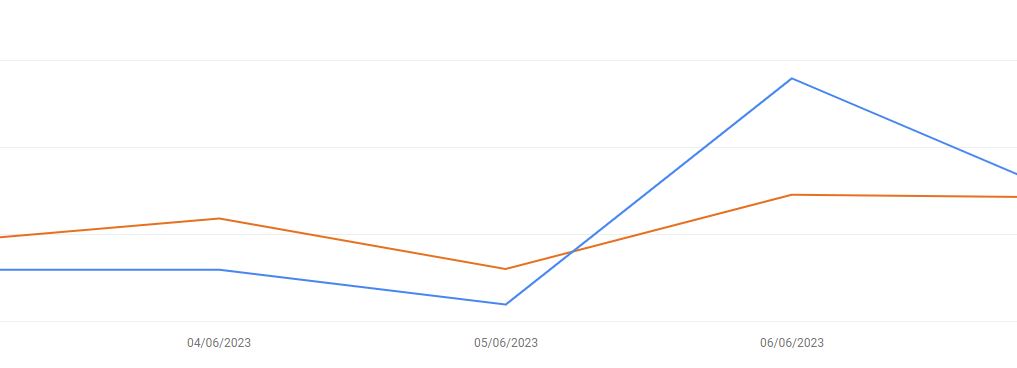Off Page SEO: Crafting Backlinks for Peak Website Performance
Table of Contents
- What is Off Page SEO?
- What are SEO backlinks?
- Key points about SEO backlinks
- Off page SEO checklist – Backlinks strategy step by step
- Is it ok to buy SEO backlinks?
What is Off Page SEO?
Off-page SEO refers to all the activities and techniques used outside a website to improve its visibility and ranking on search engine results pages (SERP). While on-page SEO focuses on optimizing elements within a website, off-page SEO is about building the website’s authority, reputation, and popularity across the web.
Off page SEO includes a few key aspects such as backlinks, social media marketing, guest blogging, influencer marketing, online reputation management, branded searches, user generated content (UGC), etc. In this article, we’ll focus on backlinks strategy creation, one of the top off page SEO activities.
What are SEO backlinks?
Backlinks are a main part of the off page strategy and refer to the creation of referring links from other websites that point to another site. The quality of backlinks can significantly influence a website’s authority, improve rankings performance and organic visibility. The backlinks quantity have a strong impact as well, as an old site with a high number of links, might gain a strong authority. However, prioritizing quality over quantity is a good practice in backlinks consideration.
Search engines, such as Google, consider backlinks as indicators of the content’s relevance, usefulness, and trustworthiness. Websites with a higher number of quality backlinks tend to have a higher chance of ranking well in search engine results.
Example of backlinks effect in a blog post
Note – Additional factors contributed to the observed traffic gap in this period. Notably, among the significant actions undertaken, the strategic implementation of backlinks played a crucial role.
Key points about SEO backlinks
- Quality matters: Not all backlinks are equal. A single backlink from a reputable and authoritative website can carry more weight than multiple backlinks from low-quality or spammy sites. Quality backlinks come from websites with high domain authority, relevant content, and a good reputation.
- Relevance is essential: Backlinks should come from websites that are topically relevant to the site’s content it refers to. For example, if there’s a blog about parenting, a backlink from a parenting magazine or baby care website would be more relevant and valuable than a backlink from a gaming site.
- Natural vs. unnatural backlinks: Search engines value natural backlinks that are earned because of the content’s quality and relevance. Unnatural or manipulative backlinks, such as those obtained through link schemes or link farms, can be non-useful or even lead to penalties from search engines and harm the SEO efforts.
- Dofollow vs. nofollow backlinks: Dofollow backlinks pass link equity and influence search engine rankings, while nofollow backlinks do not directly impact rankings. However, nofollow links can still drive traffic, diversify the site’s link profile and provide indirect SEO benefits.
- Anchor text: The text used for the backlink, known as anchor text, can also influence SEO. Using relevant keywords as anchor text can signal to search engines about the content’s topic and help improve rankings for those keywords. In these regards, diversity and natural uses can be useful to improve a site’s link profile. It can be reached by using different anchor types such as: exact keyword, long tail keyword, or a URL referring.
- Target / Destination URL: The “Target URL” or “Destination URL” in the context of backlinks refers to the specific web page on a website to which the backlink is pointing. In other words, it’s the URL of the page that will open when a user clicks on the backlink. In addition, the chosen URL destination will indicate search engines as a relevancy/authority source in the target site structure.
- The content: When it comes to creating content for backlinks, it’s essential to focus on producing high-quality, valuable, and relevant material that other websites will want to link to naturally.
Top types of content that tend to attract backlinks:
- Existing posts update in the referring site
- Informative new guest blog posts
- Expert roundups or interviews
- Case studies and success Stories
- Original research or studies
- Infographics / Images
8. Authority links: As part of the content creation and the ambition of creating quality content, it’s highly recommended to combine other links within a post and refer to other domain authorities. In addition, creating relevant inner links to the hosting site. This strategy could be another meaningful part of measuring the quality and trustworthiness of the content pointing to a website.
9. User behavior: A link that gets clicked by a user is probably one of the strongest signals for a relevant link.
Off page SEO checklist – Backlinks strategy step by step
Reaching relevant backlinks from other websites might be a long process from the moment the contact starts until the desired link is live. In most cases, the process can take a week up to a month, as it involves the referring website side, the content, and CMS editing perspectives. Here’s our step-by-step process for SEO backlinks creating:
1. Create / Ensure valuable and link-worthy content:
Before reaching out for backlinks, it’s important to ensure there’s high-quality content on the site that is going to receive the backlink. Making sure the page content is quality and provides value to readers. Content that is informative, unique, and shareable is more likely to attract backlinks.
2. Identify relevant websites:
Find websites that share relevant content and industry. Look for websites that have a good reputation, high domain authority, and an audience that aligns with the target audience of the targeted site.
yellowTIP: Start the process of identifying relevant websites – always start by viewing the site itself before running it in the different SEO tools.
- Ensure the sites share a similar niche
- Easy to use – easy to navigate and load fast
- The content is visible, and there’re no interruptions of ads
- The blog section is reachable and includes relevant content items
- Avoid link farms – prefer sites that look real, that there’s some authority behind them
3. Analysis of the site by SEO tools:
At yellowHEAD we use different types of tools in order to analyze and optimize backlinks. We do so by monitoring the site’s off page activity, relevancy, and organic authority. These are the top SEO tools we use and recommend for backlink analysis: Ahrefs, SEMrush, Moz Link Explorer, Majestic SEO.
Source: The new backlink profile in Ahrefs
Top insights to check for:
- Location – Make sure the country that gains most of the traffic is relevant to the targeted site’s audience. In addition, avoid multiple corporations from the same IP address.
- Backlinks general profile – Domain / URL rate, backlinks amount, referring domains amount, amount of rank keywords and the general organic traffic. A good practice is to compare the findings to the overall site’s niche and to the specific targeted site, to get some kind of a benchmark that would be useful in the final decision of cooperating with a site or not.
- Site performance – Dive deep into the organic traffic, organic pages, keywords and referring domains flow. Make sure there’s a stable or positive trend.
- Is there a negative trend? – A negative organic trend needs to be considered carefully to ensure the site hasn’t experienced a penalty or some type of manual action by search engine. Also, any other type of drop due to other perspectives (content or tech) that might raise a flag of avoiding contact with a site.
- Organic Keywords – Go deep into the keywords the site is ranked for. Are there top keyword positions both sites are sharing? In case yes, that could be a huge opportunity and an indicator of where to target the backlink.
yellowTIP: Most tools offer a feature of keyword filtering. To save some time in the backlinks journey, it’s necessary to use a filter to contain main keywords that reflect the targeted site’s main topic.
- Negative content & Spam – At the same stage of organic keywords and page opportunities, view and locate content or backlinks that might refer to offensive sites. In case there are such findings, consider cooperation.
Spam links awareness is critical
Spam backlinks, or “Bad neighbourhoods”, are low-quality and irrelevant links that come from suspicious, untrustworthy, or spammy website sources. These backlinks are often obtained through unethical practices and can harm a website’s search engine rankings and overall online reputation.
Positive organic traffic trend and site growth
Negative organic traffic trend caused by a manual action
4. The final stage before moving forward with the link request
Formulate the relevant topic, content and navigate link details that would be the most relevant based on the findings.
yellowTIP for topic ideas – Consider a topic that will be related to the referring site niche, content that will be indirectly related to the targeted site niche. This way you could prevent both sites from competing with each other and achieve quality cooperation.
Always remember that while these tools can provide valuable insights, the quality of backlinks is more important than the quantity.
5. Find the right contact person:
Look for the appropriate person to contact on the target website. This could be the content manager, editor, the website owner, and partners. Check the “About Us” page, “Contact” section of the website, or the blog editors to find relevant contact information for presenting a cooperation request.
6. Share the request details:
After reaching the right contact person, make the contact, and present a request with details, including the value of the cooperation to their side. Presenting the targeted site as a strong authority that is worth referring to. This might be a high incentive for the hosting site. Present the main points that were mentioned before: The type of content that is going to be written (topic/structure), the type of the link – do-follow / no-follow, the anchor text and the target URL.
7. Documentation and deadline:
Every link process should be documented. Add the full details that were mentioned before and track the status of the content and backlink creation. Once the link is live, document it in one of the preferred tracking tools.
yellowTIP: Document live links that were achieved in “Rank Ranger link manager-dashboard tool”. Monitor the site’s external links status and align with the ongoing site performance.
8. Checklist for live backlinks
- Check the article content and metadata to ensure it aligns with the requested content.
- Check the external link anchor and make sure it refers to the relevant page. Make sure it’s do-follow in case it should be.
- Make sure the new article is indexed.
- Make sure the new article is accessible to the user from the blog section and the category.
- Document the live link, follow, and analyze performance.
Is it ok to buy SEO backlinks?
Buying SEO backlinks is not recommended and can be a risky practice. Google considers the purchase of backlinks as a violation of their webmaster guidelines because it artificially inflates a website’s authority and goes against the principles of natural link building. Site owners continue to buy links, despite it being against the guidelines of Google. The reasons behind this behavior are “Short-Term Gains” – buying backlinks can sometimes lead to a temporary boost in search rankings, which can be tempting for those seeking quick results for low or high-competitive keywords. In addition, in competitive industries, some website owners may feel pressured to engage in questionable practices to keep up with competitors who may be buying links.
Conclusion
It’s essential to focus on building an organic, diverse, and high-quality backlink profile through ethical SEO practices. Creating valuable content, engaging with your audience and industry, and earning links through genuine outreach and relationship-building are beneficial strategies for long-term SEO success.
If you’re seeking expert support with off-page SEO, think about collaborating with a firm such as yellowHEAD. Renowned for its extensive experience in overseeing the process while upholding exceptional performance standards, yellowHEAD can be your ideal partner. With the appropriate strategy and know-how, crafting backlinks for peak website performance can transform into a lucrative investment, propelling your business to new heights in the online realm.
Don’t hesitate to get in touch with us at [email protected], and our team of website specialists will be thrilled to assist you!






